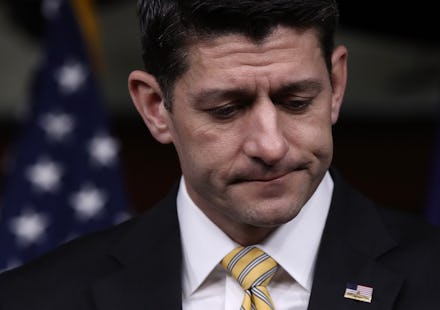House Republicans introduce their plan to repeal, recycle and reuse Obamacare

House Republicans released a draft version of legislation designed to make good on one of the party's longest-held promises: to repeal former President Barack Obama's Affordable Care Act and replace it with something different.
But in doing so, they've shone a light on the intractable problems associated with repealing a law that expanded the pool of insured Americans by an estimated 20 million people over three years, as well as laid the groundwork for a difficult political fight to get the bill past their own party and Democratic opposition.
The Republican effort to scrap "Obamacare" while recycling many of its components by other means will replace the ACA's subsidies for purchasing insurance on the individual marketplace with refundable tax credits. Those tax credits will be doled out based on a person's age, family size and income, and potentially provide less financial assistance than existing subsidies for low-income people.
The bill also effectively ends the ACA's employer and individual health insurance mandates — the mechanism by which the ACA made sure that healthy people were incentivized to get health insurance — but allows insurers to increase premiums as much as 30% after a gap in coverage.
The Republican health care do-over also ends future funding for the ACA's Medicaid expansion and returns the cutoff for eligibility to what it would have been had the ACA never been passed. However, the bill allows individuals who received coverage under the expansion over the past few years to retain Medicaid so long as they keep their coverage without any breaks.
The bill also maintains preexisting condition coverage, as well as a popular provision allowing children to stay on their parents' health care coverage until the age of 26.
As the Washington Post noted, the bill reflects a potentially unsteady compromise between conservative hawks who want to reign in the law's cost to the federal government and moderates who are concerned the law could take health care from vulnerable populations. Those dynamics raise the specter of electoral backlash for both proponents and opponents of the bill.
GOP senators Rob Portman of Ohio, Shelley Moore Capito of West Virginia, Cory Gardner of Colorado and Lisa Murkowski of Alaska signed a letter to House Majority Leader Mitch McConnell opposing any bill "that does not include stability for Medicaid expansion populations or flexibility for states," the Washington Post reported.
If the four GOP senators side with a united Democratic caucus, the GOP repeal and recycle plan could fall some two votes short of passing in the upper chamber; though other modifications to the draft legislation could potentially cause defections in either direction.
Other potential political landmines include the plan's revocation of tax credits for individual market plans which cover abortion, which is sure to trigger a furious response from reproductive health care advocates like influential family planning organization Planned Parenthood. Allowing insurance providers to charge the elderly significantly more for coverage could also backfire on the GOP, which has consolidated much of its support from older populations in recent decades.
Andrew Joyce contributed additional reporting to this story.